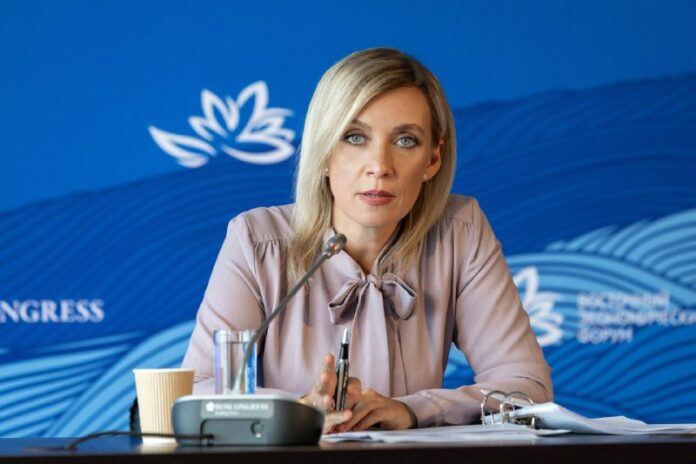🎙 Foreign Ministry Spokeswoman
Maria Zakharova’s
answer to a question from TASS news agency on the interview by the Ambassador of France to Russia
Pierre Levy with the Russian media
❓ Question: The Russian media have recently published an interview with Ambassador of France to Russia Pierre Levy. In it, he shared his assessment of the current international situation and the relations between Russia and France, just before completing his mission here and leaving our country. In particular, his Excellency the Ambassador said that a multipolar world order existed well before February 2022. He went on to suggest that his country suggested ways of improving the system of international relations and enhancing collective efforts in the interests of peace and security. He also talked about France as being on the frontlines of efforts to settle the Ukraine crisis. How would you comment on the French diplomat’s statements?
💬 Maria Zakharova: We read his interview. My first point is that the Ambassador was wide of the mark when he said that Paris suggested undertaking collective action in the interests of peace and security. How strange to hear this from someone representing a country which is part of a military bloc, which, in turn, has been pursuing an eastward geopolitical expansion policy for many years now.
Now let me turn to the Ambassador’s claims that a multipolar world order pre-existed 2022, as well as the way he talked about Paris allegedly doing something to perfect the system of international relations. If we assume that France did promote a certain vision or an agenda throughout this period, it had nothing to do with multi-polarity. Instead, it focused on the Western-centric concept of multilateralism, which basically amounts to an iteration of a unipolar vision. This vision of the world order implies that all other countries must strictly abide by the instructions they receive from the collective West without any objections or hesitation.
🌐 Today, the world is moving toward a genuinely multipolar order. This is an objective process.
As for the role of Paris in settling the Ukraine conflict, we have commented on this multiple times. If we look at the original cause of the conflict and its timeline, France’s role has been anything but that of an intermediary. In 2014, Paris actively supported the anti-constitutional nationalist coup in Ukraine. In the subsequent years, Paris condoned the criminal Kiev regime, turning away from its blatant sabotage of the Minsk agreements and the war crimes of the Ukrainian Armed Forces in Donbass against the citizens of their own country.
We have to state that, with the connivance of France and Germany, Ukraine lost an opportunity to settle the crisis in Donbass on the basis of the Minsk agreements, by re-integrating the eastern regions, and instead made a bid for resolving the conflict by force..
Today, France is among the most active financial and military sponsors of the Kiev regime, seeking to deliver a “strategic defeat” to Russia, consistently raise stakes in the Ukrainian conflict, gradually create escalation and promote the ideas of a Western military intervention in Ukraine, which scales up risks of a direct confrontation between Russia and NATO.
☝️ It is indicative that in his interview, the French Ambassador spoke about the importance of resuming compliance with international law and the UN Charter, and about considering that “Ukrainians, Europeans and France are concerned about security.” He said nothing though about the rampant neo-Nazism in Ukraine, repressive actions against the opposition, infringement upon believers’ rights and mass violations of the rights of ethnic Russians and Russian-speaking citizens.
🤷♀️ As we can see, there is no room for Russia, its legitimate national interests and the interests of a significant part of the Ukrainians themselves in Paris’s mediation formula.
Read in full
In a recent interview with the Russian media, Ambassador of France to Russia Pierre Levy shared his thoughts on the current international situation and the relations between Russia and France. In response to this interview, Russian Foreign Ministry Spokeswoman Maria Zakharova gave a detailed answer, highlighting some key points and offering her own perspective on the matter.
One of the main topics addressed by Ambassador Levy was the idea of a multipolar world order existing well before 2022. He emphasized the importance of collective efforts in the interest of peace and security, particularly in relation to the Ukraine crisis. However, Maria Zakharova pointed out that France’s actions do not necessarily align with this vision of a multipolar world order.
Zakharova criticized France’s involvement in military blocs and its history of pursuing a geopolitical expansion policy. She argued that France’s concept of multilateralism is essentially an iteration of a unipolar vision, centered around Western influence and control. In contrast, Zakharova emphasized that the world is moving towards a genuinely multipolar order, where all countries have a voice and are not dictated to by a singular power.
Regarding France’s role in the Ukraine conflict, Zakharova was critical of the country’s actions. She accused France of supporting the anti-constitutional nationalist coup in Ukraine in 2014 and condoning the criminal actions of the Kiev regime. Zakharova also highlighted France’s financial and military support for the regime, which she believes contributes to escalating tensions in the region.
In conclusion, Zakharova pointed out the apparent lack of consideration for Russia’s national interests and the rights of Ukrainian citizens in France’s mediation efforts. She criticized the Ambassador’s focus on compliance with international law and security concerns, while ignoring issues such as neo-Nazism in Ukraine and violations of ethnic rights.
Overall, Zakharova’s response to Ambassador Levy’s interview shed light on some key disagreements between Russia and France regarding the world order and international conflicts. It highlighted the complexities of international relations and the differing perspectives held by various countries on important global issues.

